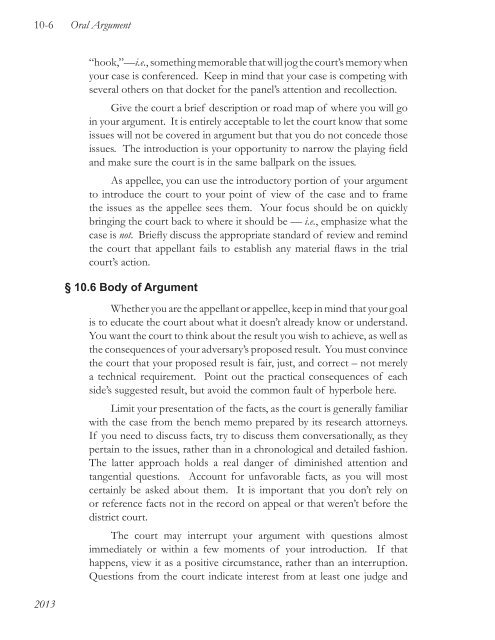Create successful ePaper yourself
Turn your PDF publications into a flip-book with our unique Google optimized e-Paper software.
10- <strong>Oral</strong> <strong>Argument</strong><br />
2013<br />
“hook,”—i.e., something memorable that will jog the court’s memory when<br />
your case is conferenced. Keep in mind that your case is competing with<br />
several others on that docket for the panel’s attention and recollection.<br />
Give the court a brief description or road map of where you will go<br />
in your argument. It is entirely acceptable to let the court know that some<br />
issues will not be covered in argument but that you do not concede those<br />
issues. The introduction is your opportunity to narrow the playing field<br />
and make sure the court is in the same ballpark on the issues.<br />
As appellee, you can use the introductory portion of your argument<br />
to introduce the court to your point of view of the case and to frame<br />
the issues as the appellee sees them. Your focus should be on quickly<br />
bringing the court back to where it should be — i.e., emphasize what the<br />
case is not. Briefly discuss the appropriate standard of review and remind<br />
the court that appellant fails to establish any material flaws in the trial<br />
court’s action.<br />
§ 10.6 Body of <strong>Argument</strong><br />
Whether you are the appellant or appellee, keep in mind that your goal<br />
is to educate the court about what it doesn’t already know or understand.<br />
You want the court to think about the result you wish to achieve, as well as<br />
the consequences of your adversary’s proposed result. You must convince<br />
the court that your proposed result is fair, just, and correct – not merely<br />
a technical requirement. Point out the practical consequences of each<br />
side’s suggested result, but avoid the common fault of hyperbole here.<br />
Limit your presentation of the facts, as the court is generally familiar<br />
with the case from the bench memo prepared by its research attorneys.<br />
If you need to discuss facts, try to discuss them conversationally, as they<br />
pertain to the issues, rather than in a chronological and detailed fashion.<br />
The latter approach holds a real danger of diminished attention and<br />
tangential questions. Account for unfavorable facts, as you will most<br />
certainly be asked about them. It is important that you don’t rely on<br />
or reference facts not in the record on appeal or that weren’t before the<br />
district court.<br />
The court may interrupt your argument with questions almost<br />
immediately or within a few moments of your introduction. If that<br />
happens, view it as a positive circumstance, rather than an interruption.<br />
Questions from the court indicate interest from at least one judge and

















